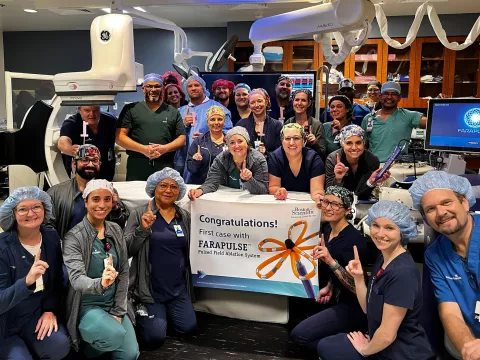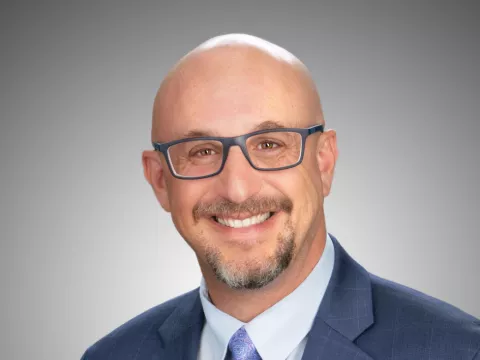- AdventHealth
In June, AdventHealth Cancer Institute (AHCI) became the second center in Florida to offer hepatic artery infusion (HAI) as a treatment option for patients with colorectal liver metastases or cholangiocarcinoma (bile duct cancer). Used in combination with systemic chemotherapy, HAI increases response rates, shrinking the liver tumors and resulting in conversion to resection for about 50% of patients.
During this procedure, an HAI pump is surgically placed just below the skin in the lower abdomen and connected by a small catheter into the gastroduodenal artery. This pump slowly delivers a high concentration of floxuridine, about 400 times the amount that can be delivered through a vein, directly to the liver. The liver metabolizes the floxuridine without systemic absorption, reducing toxicity and minimizing side effects.
Colorectal cancer is the fourth most common cancer in the U.S. with an estimated 151,030 new cases and 52,580 deaths projected for 2022. Unfortunately, more than half of colorectal cancer patients develop liver metastases, the leading cause of death for these patients. While resection of the liver metastases is the strongest contributor to long-term survival, only about 15 to 20% of cases are resectable.
“Median survival for patients with unresectable colorectal liver metastases who receive systemic chemotherapy is only about 32 to 36 months,” explains AHCI surgical oncologist Sebastian de la Fuente, MD, who specializes in pancreatic, liver and hepatobiliary oncology. “The three-year survival rate for patients who are able to undergo resection is around 80% so being able to convert more patients to resection is a significant improvement. With the HAI pump, we can achieve similar long-term outcomes as if the patient presented initially with resectable disease, providing new hope to patients who are otherwise running out of therapeutic options.”
Improving Chemotherapy Response Rates
Overall response rates for treatment of colorectal liver metastases with systemic chemotherapy alone are only about 10 to 30 percent. Adding the HAI pump as an adjuvant increases these rates to around 80%. It also provides a new possible treatment for patients with cholangiocarcinomas, which have historically lacked effective systemic chemotherapy options.
“While the HAI pump has been around for nearly 30 years, we now have better systemic chemotherapies,” shares AHCI medical oncologist Mohamedtaki Tejani, MD.
“By taking a multi-modality approach and adding the pump to these newer regimens, we can achieve a remarkably better response for patients.”
AHCI medical oncologist Ahmed Zakari, MD, concurs. “Using the HAI pump, we can deliver a stronger chemotherapy agent directly to the liver tumors while sparing the surrounding healthy tissue,” he says. “And because of the limited systemic toxic side effects, we can concurrently treat the patients with full doses of systemic chemotherapies.”
A Multidisciplinary Approach to Achieve the Best Possible Outcomes
Successful implementation of this new treatment option at AHCI requires a multidisciplinary approach and coordination across multiple teams, including medical oncology, surgical oncology, nuclear medicine, infusion unit nurses, operating room nurses and pharmacists, to achieve the best possible patient outcomes. All have completed specialized training.
“Our planning started nearly a year ago with guidance from colleagues at Duke University where I completed my training,” explains Dr. de la Fuente. “We wanted to offer our patients access to the same level of care without having to travel so far from home.”
The surgery to place the HAI pump is performed under general anesthesia, similar to placement of a traditional chemotherapy port. Most patients then receive a new infusion through their pump every two weeks at the AHCI Infusion Center in Orlando for the duration of their prescribed treatment regimen. Periodic imaging allows the treating oncologists to monitor progress and determine if and when surgical resection is possible. Early intervention tends to yield better outcomes.
“The sooner we get these patients, the better they will do,” comments Dr. de la Fuente. “As oncologists, we strive to provide each of our patients with access to the best treatment options that will allow them to live a longer, higher-quality life. The HAI pump helps us do just that.”
AHCI hopes to increase patient access to this new treatment approach and remains committed to bringing the latest advances in colorectal cancer care to the Central Florida community.
For more information or to refer a patient, contact our patient navigator at Call407-303-5981.
Recent News
The AdventHealth Neuroscience Institute is the first in Florida and one of the first in the country to begin recruiting patients with primary progressive or non-active secondary progressive multiple...
Discover what’s being accomplished in Central Florida to bridge the health gap with Orange County Mayor Jerry Demings and AdventHealth’s Dr. Alric Simmonds.
Breakthrough device offers new hope for stroke survivors struggling with rehabilitation following ischemic stroke
The Convergent Hybrid Ablation procedure has been gaining acceptance as an effective treatment option for long-standing persistent atrial fibrillation (AFib) since the CONVERGE trial data published in...
Recently, AdventHealth for Children pediatric orthopedic surgeon Sean Keyes, DO, Katelyn Smith, PA-C, and their team performed their 100th bridge-enhanced anterior cruciate ligament (ACL) repair (BEAR...
AdventHealth recently began piloting a new Genomics Risk Assessment for Cancer and Early Detection (GRACE) program that combines the use of digital mammography, artificial intelligence (AI) technology...
AdventHealth Clinical Research Unit (CRU) Executive Director and Medical Director of Genitourinary Oncology Guru Sonpavde, MD, co-authored an article on the AMBASSADOR Phase III clinical trial results...
AdventHealth Research Institute is currently seeking physicians experiencing exhaustion, irritability, hopelessness, anxiety, work/home imbalance or similar burnout symptoms to participate in a...
A promising new treatment for AFib patients called Pulse Field Ablation is first offered in Central Florida at AdventHealth and shows less damage to tissue.
Plastic and Reconstructive Microsurgeon Sabrina Pavri, MD, and Breast Surgeon Devina McCray, MD, recently began offering immediate neurotization after breast reconstruction, a new surgical technique...
Explore the healing power of music for stroke survivors and their families in this episode of the Inspiring Wholeness podcast.
Dr. Andrew Weinfeld will be responsible for executing clinical and organizational strategy, improving clinical effectiveness and patient safety, and delivering exceptional patient experiences for the...












